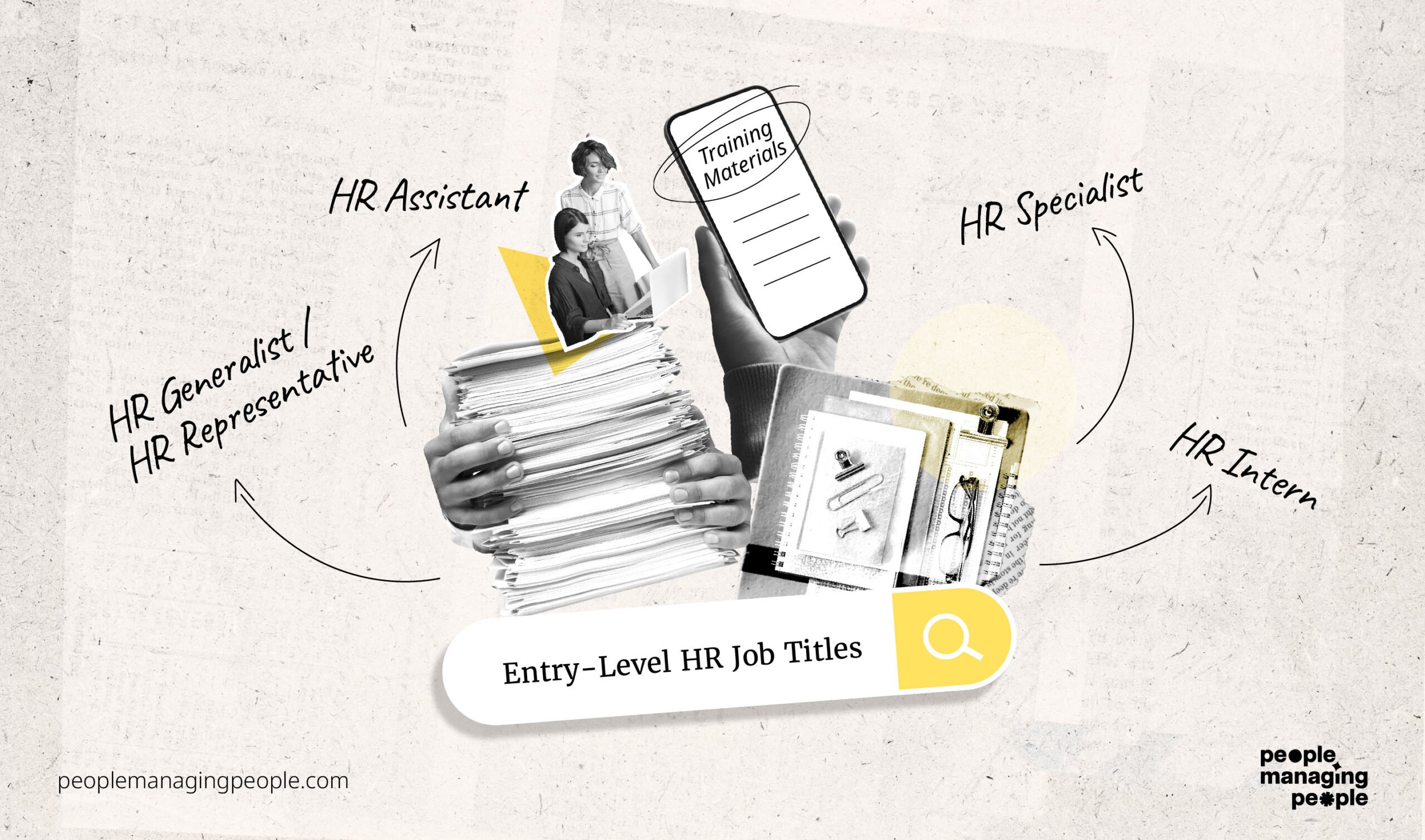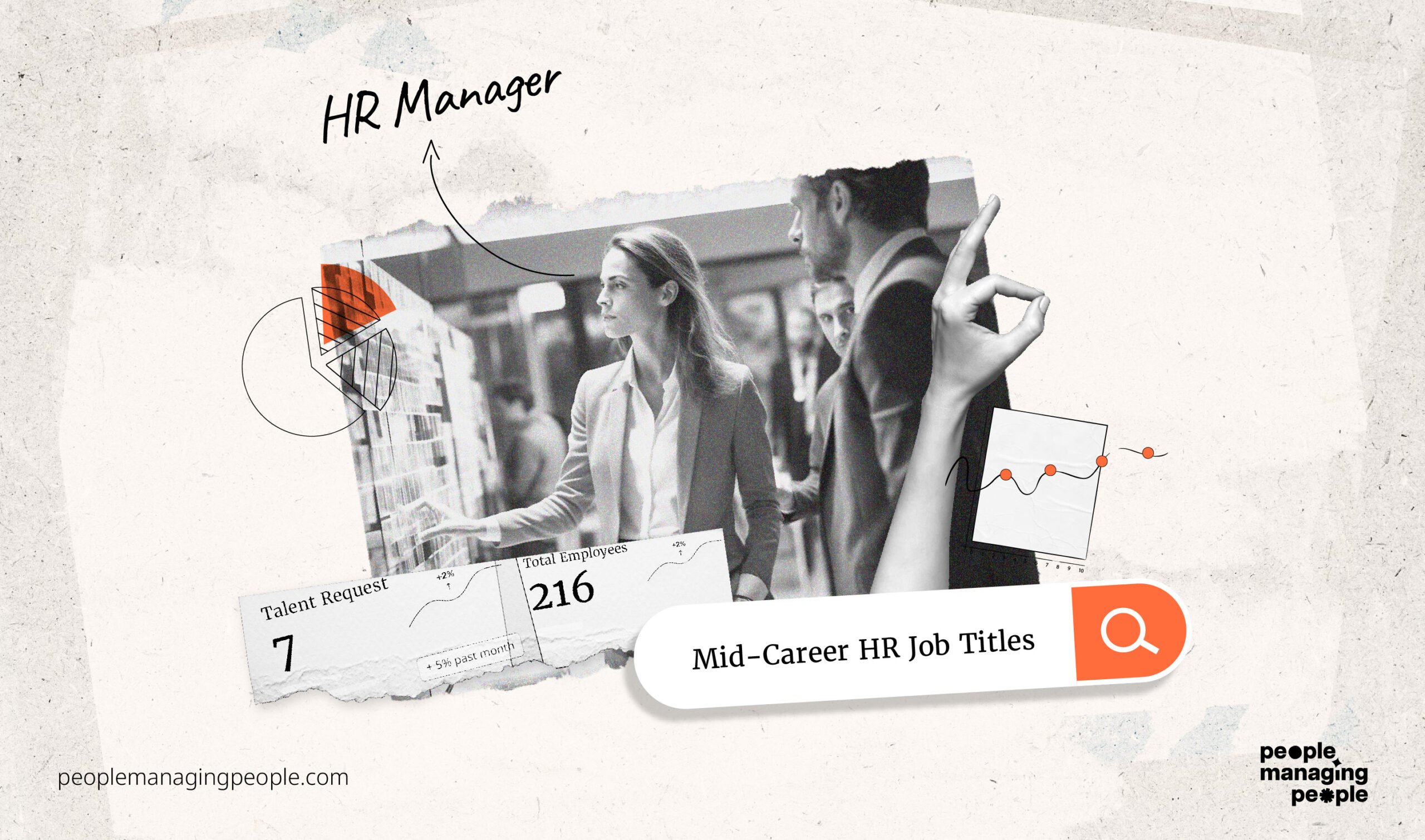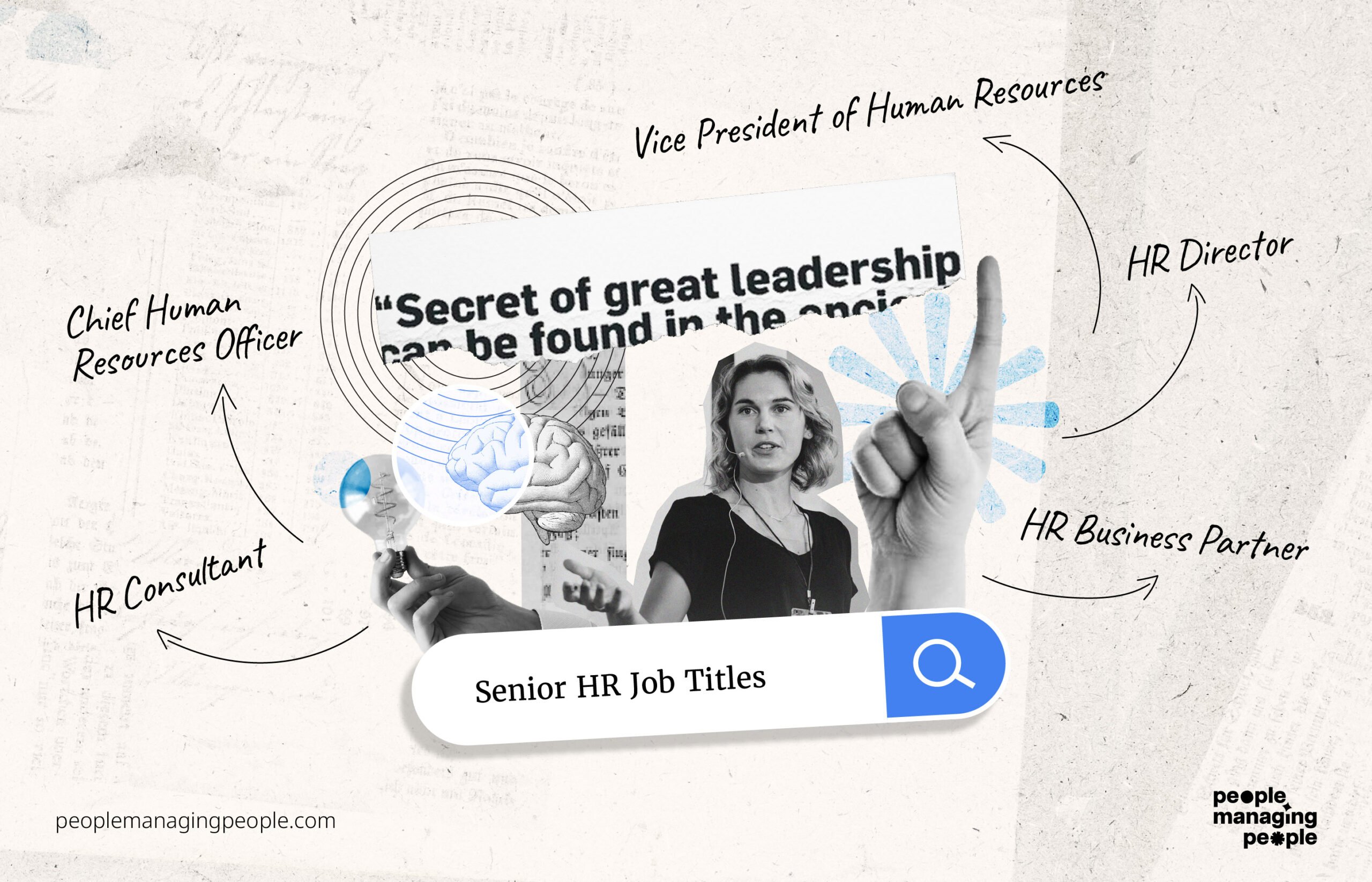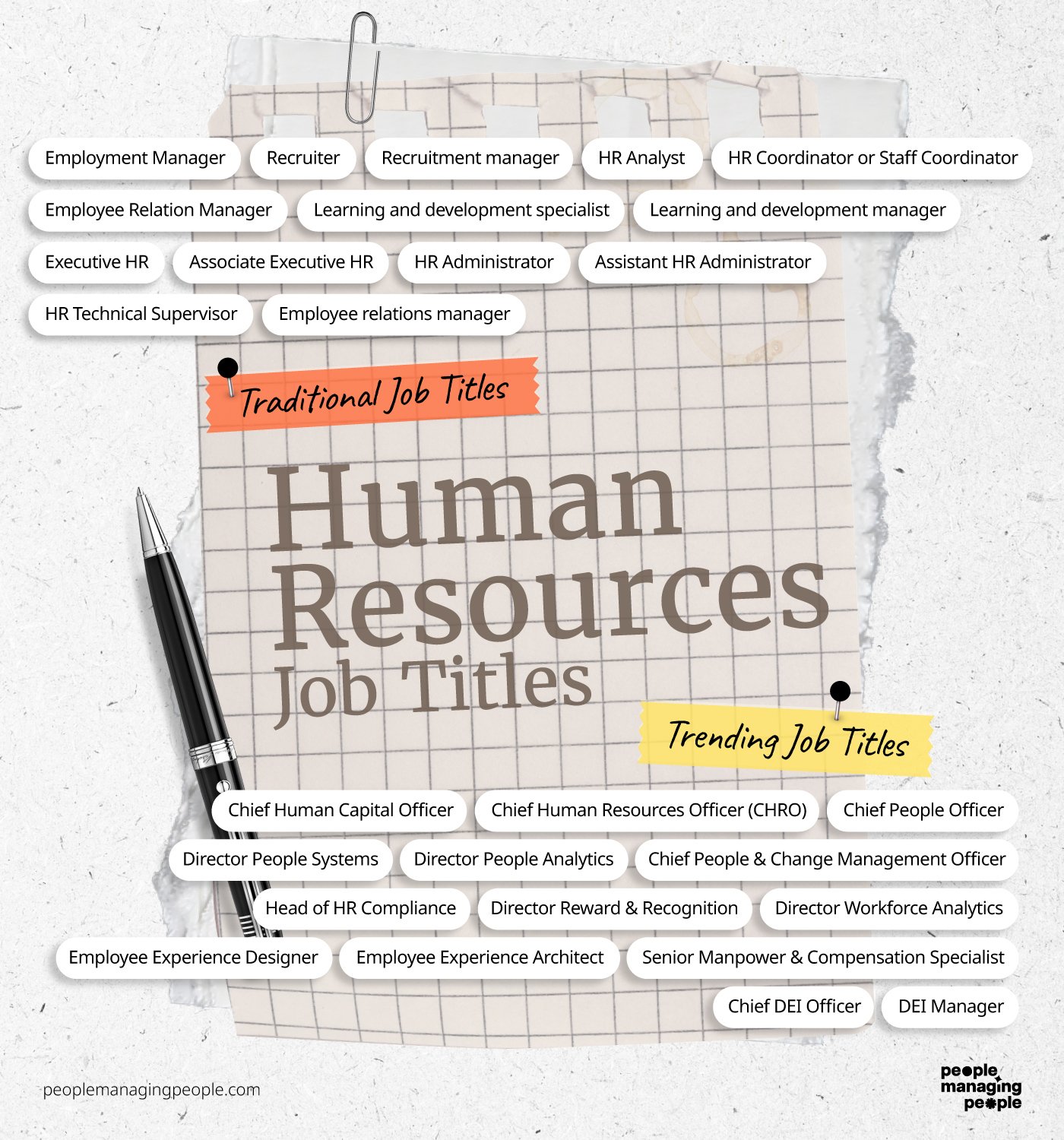Working in human resources can be a rewarding experience and, with new roles evolving all the time, there’s ample opportunity to branch out and build the right career for you.
To learn more about the potential career paths available to an HR professional, check out our list of human resources job titles below.
Please bear in mind that terms can be used interchangeably, and quite loosely, so what really matters when it comes to role and career advancement is what you spend your time doing and how much autonomy you have.
Note also that salaries vary depending on location and years of experience in a role.
Entry-Level HR Job Titles

HR Intern
Working as an HR intern is a great way to get your foot in the door when it comes to a career path in human resources.
Interns learn the ropes by playing a variety of roles in the HR department. This includes: maintaining accurate employee files within an organization’s information systems, helping organize and screen resumes and job postings, and supporting the department with executing company policies.
HR Assistant
An HR assistant’s primary job is to help HR generalists, managers, and directors accomplish HR-related tasks.
Their daily work tends to be administrative tasks including documenting grievances, compensation, absences, terminations, performance reviews, and benefits information. They can also play a role in recruitment and employee training.
HR Generalist / HR Representative
HR Generalist/HR representative’s responsibilities vary a great deal, covering a wide span of tasks including dealing with benefit plans, compensation management, writing new HR policies, talent acquisition, onboarding, performance management, and employee relations and/or labor relations.
Many employers require a bachelor's degree or higher and taking an HR certification can also put you in good stead.
HR Specialist
As the name suggests, a human resources specialist is someone who specializes in a particular aspect of the HR function e.g. compensation, benefits, or leave.
For example, a Leave of Absence Specialist would help facilitate leave quests and advise managers and employees on terms of leave and manage case files in accordance to state and federal regulations.
Other specialist roles include:
- Payroll specialist—responsible for managing the payroll process using payroll software
- Talent acquisition specialist—sourcing and screening candidates and overseeing tools like the applicant tracking system
- Onboarding specialist—aiding with the onboarding of new hires and ensuring the process is as effective as possible with the help of onboarding software solutions
- People analytics/HR analyst—collecting employee data and interpreting it to guide talent management activities
- Mergers and acquisitions specialist—responsible for the smooth integration of two organizations
- Organizational development specialist—building out systems and processes to help organizations develop smoothly
- DEI specialist—overseeing the org’s DEI strategy and its implementation
- HRIS specialist—responsible for maintaining the org’s employee data in the corporate human resources information system (e.g., roles, salaries, personal details, etc.)
- Benefits administrator—helping with enrollment and designing the org’s benefits package
- Compensation specialist—analyzing the market and helping design the org’s overall pay philosophy and pay structure.
- Communications specialist—ensuring internal communications are streamlined and effective.
Mid-Career HR Job Titles

HR departments offer ample opportunities to progress either vertically or horizontally. Some mid-level HR positions include:
HR Manager
An HR manager can play many different roles and is normally competent in several areas, including overseeing the recruitment of new employees as well as helping develop those underneath them.
HR managers act as internal experts on HR-related matters and help support the relationship between management and the current employees. As such, the following competencies are required of an HR manager:
- Communication. Ability to communicate with everyone in the workplace.
- Analytical and critical thinking. Provide sound judgment and decision-making across various areas of HR.
- Relationship-building. Ability to create a cohesive department that works collaboratively to achieve shared goals.
- Leadership. Ability to create strategic plans that are tied to organizational goals and motivate others to
- Coaching. Coaching is an important skill for HR managers to help with the development of managers and their direct reports.
In smaller organizations, HR managers might take on a more generalist role covering a wide range of functions. In larger organizations, it’s possible to work up to manage a team of specialists e.g. talent acquisition or benefits manager.
Senior HR Job Titles

Higher levels within an HR team include:
HR Consultant
Human resources consultants focus on effectively utilizing personnel to achieve the goals of a company. They devise strategies to make the most effective use of personnel within a company.
HR Business Partner
An HR Business Partner (HRBP) is an experienced HR professional who works closely with management and leadership on talent management. HRBPs maintain strong business literacy and help facilitate HR strategy as it integrates with an organization’s business objectives.
HRBPs also monitor and report on the organization’s workforce, including temporary employees or vendors, facilitate HR tools, and provide guidance on organizational structure.
HR Director
HR directors oversee a region, or multiple locations, or serve as the highest-ranking member of HR within a single company. CHRO certifications can help directors advance to executive-level positions.
They are responsible for building annual budgets and making decisions about purchasing new HR software, systems, and negotiating benefits offerings for the company.
Again, it’s possible to either be a general director or director for a specific specialization e.g. recruiting director or chief diversity officer.
Vice President of Human Resources
The VP of HR works with the executive team concerning business objectives and is responsible for understanding how HR-focused programs and services drive company revenue.
They also try to integrate people into the full scope of business operations and evaluate how staff benefits the overall business.
Chief Human Resources Officer
An organization’s Chief Human Resource Officer (CHRO) is responsible for strategic leadership and management for an organization. This includes succession planning and talent management, along with training and compensation.
The CHRO would develop comprehensive recruitment and retention plans to meet the talent needs of the organization.
The CHRO also works directly with executive leaders to comprehensively combine human capital management with business objectives.

Traditional List of Human Resources Job Titles
The above list of roles is by no means extensive and rather fluid. Other roles you might come across include:
- Employment Manager
- Recruiter
- Recruitment manager
- HR Analyst
- HR Coordinator or Staff Coordinator
- Employee Relation Manager
- Learning and development specialist
- Learning and development manager
- Executive HR
- Associate Executive HR
- HR Administrator
- Assistant HR Administrator
- HR Technical Supervisor
- Employee relations manager
Trending HR Titles
Current trends in human resources titles include:
- Chief Human Capital Officer
- Chief Human Resources Officer (CHRO)
- Chief People Officer
- Chief People & Change Management Officer
- Director People Analytics
- Director People Systems
- Director Workforce Analytics
- Director Reward & Recognition
- Head of HR Compliance
- Senior Manpower & Compensation Specialist
- Employee Experience Architect
- Employee Experience Designer
- DEI Manager
- Chief DEI Officer
Is HR A Good Career?
HR is a great career choice for anyone who enjoys helping organizations grow through their talent and can lead to a wide range of career paths.
As the function continues to develop and new HR pillars are built, we’re seeing an increasing amount of HR leaders become CEOs or move into high-level operational roles. Maybe you could even transition from HR to another career.




